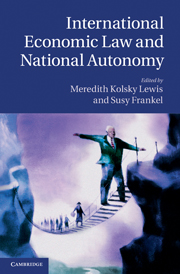Book contents
- Frontmatter
- Contents
- Notes on contributors
- Acknowledgements
- Introduction
- PART I International economic law: conceptions of convergence and divergence
- PART II WTO treaty interpretation: implications and consequences
- PART III Responding to international economic law commitments
- PART IV Transformations in international economic law
- 11 Foreign investors vs sovereign states: towards a global framework, BIT by BIT
- 12 How ‘trade in services’ transforms the regulation of temporary migration for remittances in poor countries
- 13 Reconceptualising international investment law: bringing the public interest into private business
- Index
- References
12 - How ‘trade in services’ transforms the regulation of temporary migration for remittances in poor countries
from PART IV - Transformations in international economic law
Published online by Cambridge University Press: 10 January 2011
- Frontmatter
- Contents
- Notes on contributors
- Acknowledgements
- Introduction
- PART I International economic law: conceptions of convergence and divergence
- PART II WTO treaty interpretation: implications and consequences
- PART III Responding to international economic law commitments
- PART IV Transformations in international economic law
- 11 Foreign investors vs sovereign states: towards a global framework, BIT by BIT
- 12 How ‘trade in services’ transforms the regulation of temporary migration for remittances in poor countries
- 13 Reconceptualising international investment law: bringing the public interest into private business
- Index
- References
Summary
Introduction
The ‘services economy’ is a proxy term for the transformation of capitalism in the later twentieth century. By the 1960s, the golden age of industrial capitalism supported by the Keynesian nation-state was in decline. Twenty years later, it was over. The prospects for the future prosperity of Western economies now rested on the transnational service-driven economy, later embraced within a technology-enhanced ‘knowledge economy’. To realise this potential it was necessary to replace the regime that had regulated services for a range of social, cultural, democratic, economic and developmental objectives with one that privileged a commodified notion of services that could be traded within internationalised markets. The non-market dimensions of services and the primary factors of their production – labour, capital and knowledge – had to be reconceived within the new paradigm.
This regulatory transformation began at the national level through neoliberalism. States were then urged to entrench their commitment to market regulation through a supranational regime that functions as enabler, catalyst and enforcer of open international services markets. The standard-bearer for that regime is the World Trade Organization's General Agreement on Trade in Services (GATS). This multilateral treaty sets the ideological parameters and legal minimum content for a plethora of bilateral and regional agreements that have overtaken it in depth and scope in recent years. Progressively, national regulatory autonomy and the multifaceted priorities accorded by governments to the regulation of services activities have become subordinated, on pain of economic sanctions, to this panoply of international trade treaties.
- Type
- Chapter
- Information
- International Economic Law and National Autonomy , pp. 269 - 294Publisher: Cambridge University PressPrint publication year: 2010
References
- 1
- Cited by

